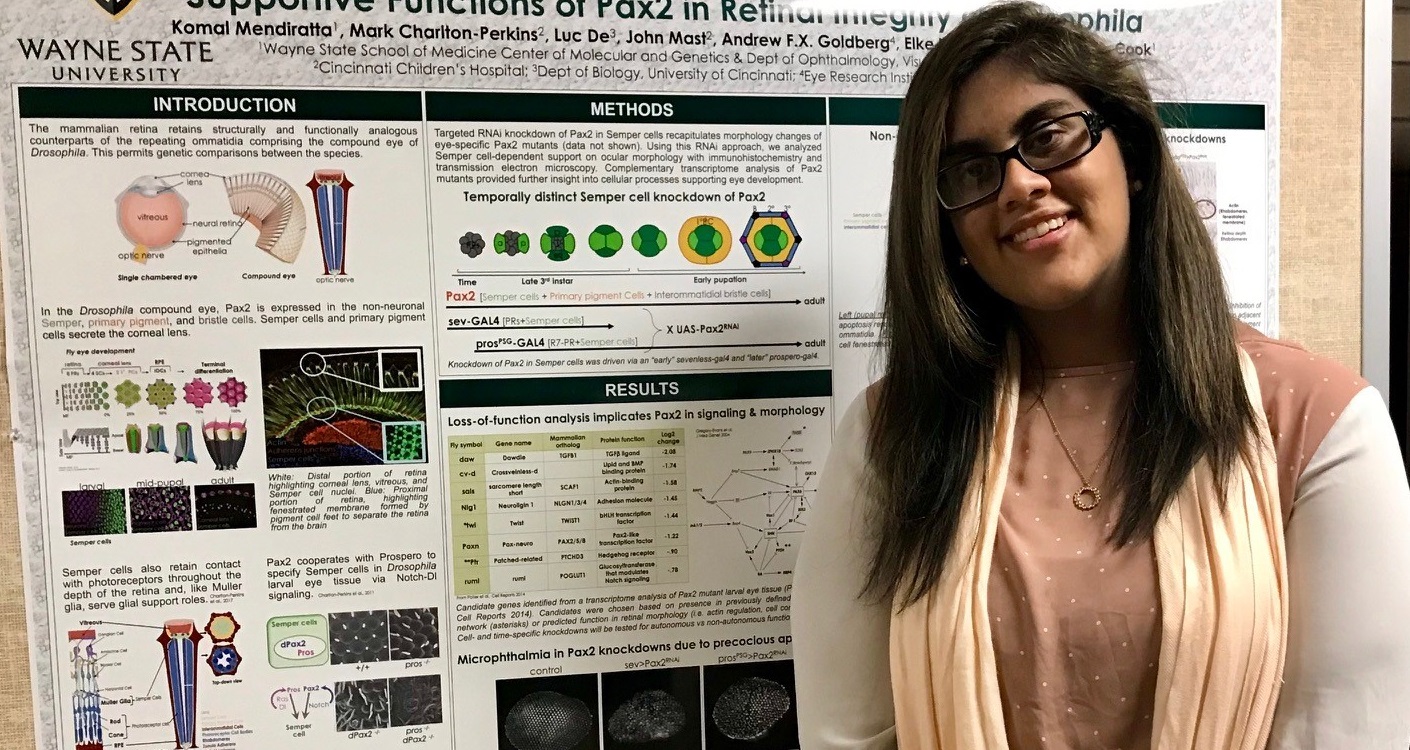
Komal Mendiratta, a first-year medical student and basic medical sciences master's degree graduate, was among the students invited to present research.
The Wayne State University School of Medicine hosted its final sesquicentennial signature event Oct. 17, held in celebration of 150 years of academic research and clinical care excellence in the heart of Detroit. Nearly 250 attended the Frontiers in Medicine and Science symposium, featuring plenary presentations from six nationally renowned speakers leading the way in the future of medicine and science, as well as poster-based research presentations from a select group of School of Medicine graduate students well on their way to becoming the next generation's scientific pioneers.
Allison Mitchell, a fourth-year doctoral student in the Cancer Biology Graduate Program, was among the students invited to present research at the event.
"I was really honored, because I know this is an important milestone for the university. To be considered a young, budding scientist is great, especially among my peers," Mitchell said.
In keeping with the collaborative and educational spirit of the day, she found her research focus shared scientific commonalities with invited students from other disciplines, including one in the cardiovascular field presenting next to her.
"I found we have a lot in common. It is interesting to see how things overlap," Mitchell added.
First-year medical student Komal Mendiratta was thrilled to participate as well, especially because the work she completed for her master's degree project at WSU involved a somewhat uncommon model to study retinal disease - drosophila, or flies. Her mentor is Tiffany Cook, Ph.D., an associate professor in the Center for Molecular Medicine and Genetics, and of the Department of Ophthalmology, Visual and Anatomical Sciences.
"It has been really fantastic to highlight the fact that we can use the fly to mimic human disease," Cook said. "That's the greatest compliment, to be asked to be involved."
The day's speakers and topics included Steven Rosenberg, M.D., Ph.D., who is chief of the Surgery Branch of the National Cancer Institute of the National Institutes of Health. WSU Professor of Pathology Martin Bluth, M.D., Ph.D., was among the audience members for Dr. Rosenberg's lecture, "Lymphocytes as a Drug for the Treatment of Cancer."
"I became enamored in Applied Immunology and pursued this as my thesis and postdoc work after being inspiring by Dr. Rosenberg's pioneering work in Immunotherapy some 30 years ago. Bravo for bringing him to WSU," Dr. Bluth said.
The day's speakers and topics also included:
Mina Bissell, Ph.D., distinguished scientist, Biological Systems and Engineering for the Lawrence Berkeley National Laboratory at the University of California, Berkeley, presented "Why Don't We Get More Cancer: The Importance of Extracellular Matrix and Organ Architecture."
Helen Mayberg, M.D., director of the Center for Advanced Circuit Therapeutics at the Icahn School of Medicine at Mount Sinai, New York, presented "Tuning Depression Circuits Using Deep Brain Stimulation."
Paul Sieving, M.D., Ph.D., director of the National Eye Institute of the National Institutes of Health, presented "Human Ocular Gene Therapy: Considerations from X-linked Retinoschisis."
Michael Snyder, Ph.D., chair of Genetics and the Stanford W. Ascherman Professor at Stanford University, presented "Big Data and Health."
Clyde Yancy, M.D., M.Sc., vice dean of Diversity and Inclusion, and the Magerstadt Professor of Medicine and professor of Medical Social Sciences and chief of Cardiology at Northwestern University, presented "Heart Failure in African-Americans; a Puzzle Resolved."